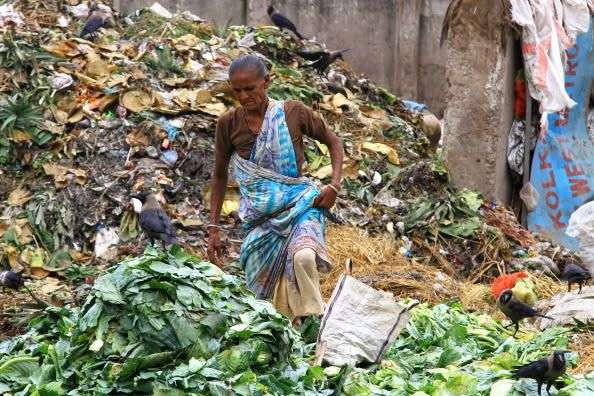
A scavenger at a vegetable wholesale market in India.
Nisa Maier / Getty Images
CNBC’s eighth annual Disruptor 50 list, revealed last week, identified private companies that are changing the world in unimaginable ways. Yet there’s one dramatic trend that has nothing to do with the underlying technologies driving their growth: a social or environmental mission that is core to their business model.
This year 43 of the 50 companies CNBC identified — which collectively have pulled in over $74 billion in venture capital, according to PitchBook, at an implied Disruptor 50 list market valuation of near-$277 billion — are finding that doing good isn’t just an afterthought but can be core to driving their business growth. From cybersecurity and health IT to logistics/delivery, fintech and agriculture, this new wave of billion-dollar businesses is seeing that helping underserved communities and minimizing environmental impact is central to boosting their bottom line.
Here are the ways these Disruptors are fueling success through their far-reaching environmental and social responsibility efforts.
Food sustainability
Goleta, California-based Apeel Sciences is addressing the massive, if largely unspoken, food-waste problem on the planet. The company has developed an edible substance that, when applied to the outside of harvested fruits and vegetables, creates an invisible shield that can double their lifespan without refrigeration. This, the company says, doesn’t just help grocery chains and their suppliers, it’s addressing the fact that currently, a third to a half of all food produced is wasted, and food waste is responsible for 8% of global greenhouse-gas emissions.
“As we extend our global reach, we’re now able to help alleviate food waste and unlock economic value for growers, retailers and consumers across four continents” Apeel told CNBC. “Accomplishing our mission means that the global food system will not only waste less food but also waste less water and energy while simultaneously increasing availability and access to fresh food.”
James Rogers, CEO, Apeel Sciences
Scott Mlyn | CNBC
Eat JUST and Impossible Foods, both of which create alternatives to animal-derived products, aim to offset the food system’s dependence on animal agriculture, which has a greater impact on the planet. And Boston-based Indigo Agriculture, an agricultural technology start-up that has created seed treatments that optimize the health of a plant in order to increase its yield, is looking to help farmers address climate change and improve their output to feed the planet.
Environmental impact
Companies are addressing environmental impact from a range of perspectives: Korean e-tailer Coupang, which snagged the No. 2 spot on CNBC’s Disruptor 50 list, is eliminating boxes for 60% of products shipped, wiping out waste and allowing nearly twice the number of packages to travel in a single truck. LanzaTech, a Chicago-based company launched in 2005, transforms pollution into fuel or plastic. In early June the company announced the spin-out of LanzaJet to bring sustainable aviation fuel to the commercial market.
LanzaTech partners with industrial customers to capture carbon-rich emissions and pump them into a reactor filled with microbes first identified in rabbits. The microbes feed on the carbon and produce ethanol, the biofuel that is blended into most U.S. gasoline.
Consumer health
Health-care start-ups everywhere are utilizing new ways to improve treatments and access to health care, provide affordable solutions, offer at-home care and more. And the companies on this list are no exception. Chicago-based Tempus is making precision medicine for cancer, as well as cardiology and diabetes, to help people live longer, healthier lives. K Health and Heal use telehealth tools to bring information and guidance from doctors to patients so they don’t have to leave their homes. The Israeli founders of Healthy.io is creating affordable solutions for chronic medical conditions; Zipline is delivering lifesaving medical deliveries for patients via drone.
Zipline, a drone company valued at over $1 billion and best-known for blood and vaccine deliveries in Africa, has a new deal in the U.S. with Walmart that will take it beyond its roots in the life-saving medical supply market.
Zipline International
Access to insurance and capital
Insurance-provider Lemonade is a certified B-Corp, with the goal of making insurance a social good. It also has a feature called Lemonade Giveback, where leftover premiums are donated to charities. And the company says this focus helps them: “We believe that the trite saying about profit maximization being in conflict with social impact needs to be reconsidered. The truth is, one needn’t come at the expense of the other; consumers want to invest in brands whose values align with their own.”
Ohio-based Root Insurance is focused on making car insurance more fair and preventing bias. By relying less on credit score, Zip code and driving history, Root enables low-income, immigrant and young drivers, who have traditionally been placed in high-risk pools, to escape the high rates.
Fintech has morphed into an engine for social good, and this year’s Disruptor list features four. Tala focuses on expanding financial access to traditionally underserved communities via their digital lending app and global network. Its mission: to enable and accelerate financial health by offering microloans to people in emerging markets. Trulioo‘s aim is to facilitate access to financial services for 2 billion people. And SoFi and Robin Hood want to give consumers more control over their finances with fewer fees.
Education
Three of the 2020 Disruptors are helping to upskill, an essential mission as workers around the U.S. are being furloughed or laid off during the pandemic. Guild Education, a certified B-Corp, and Coursera, are providing free classes to the unemployed and college students; Duolingo, the most-downloaded education app, is offering free language lessons to break down barriers to opportunities.


